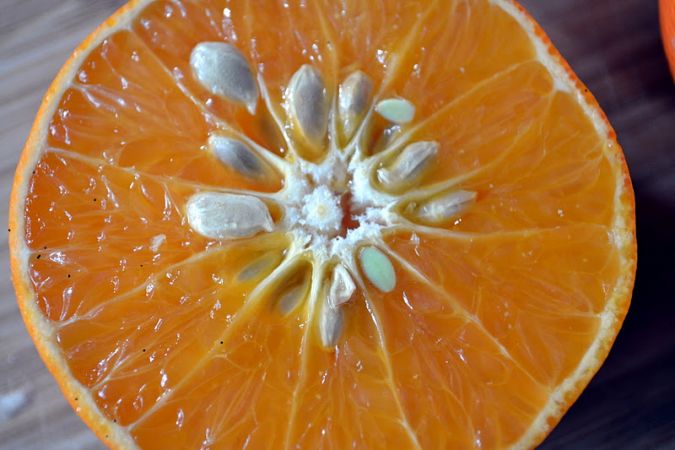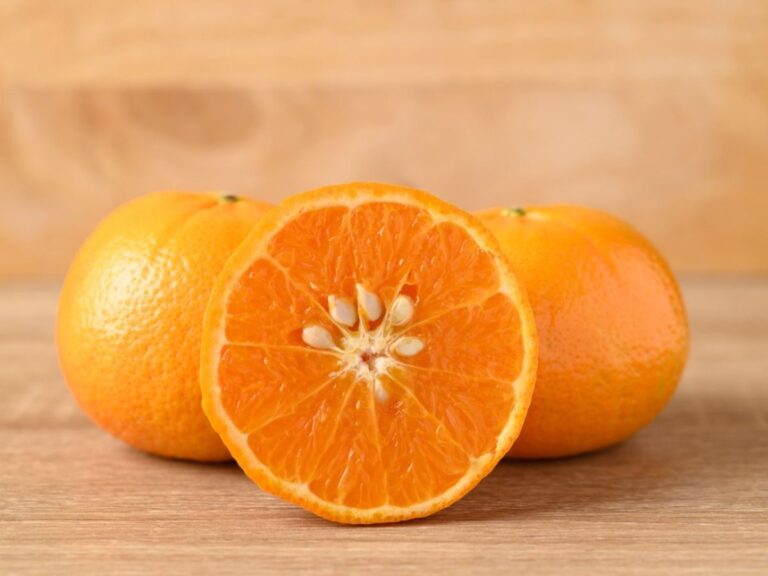Yes, you can eat orange seeds, but it’s important to consider a few things. Orange seeds are safe to consume in moderation, and they contain small amounts of nutrients like fiber and antioxidants.
However, they have a bitter taste, and some people may find them unpleasant. It’s generally fine to eat the seeds, but if you prefer to avoid the bitter taste, you can easily remove them before consuming the orange.
While orange seeds are edible, it’s crucial to be mindful of quantity and personal preference to ensure an enjoyable eating experience.
Factors to Consider to Eat Orange Seeds

Orange seeds contain small amounts of nutrients, including fiber and antioxidants. Despite their bitterness, these nutritional elements contribute to the overall health benefits of consuming the entire fruit.
The bitterness in orange seeds is subjective, with individual taste preferences playing a crucial role. Some people may not mind the bitter taste, while others might find it unpleasant.
While not commonly consumed on their own, orange seeds can be incorporated into various culinary creations. Grinding them into a powder or using them in cooking and baking can provide a way to benefit from their nutritional content without experiencing the direct bitterness.
Nutritional Content of Orange Seeds
Orange seeds, often overlooked, harbor a modest yet notable nutritional profile. While their size is small, they contribute to the overall nutritional richness of the fruit.
Macronutrients
Protein: Orange seeds contain protein, an essential macronutrient vital for various bodily functions, including tissue repair and immune system support.
Fiber: Rich in dietary fiber, orange seeds contribute to digestive health by promoting regular bowel movements and aiding in the prevention of constipation.
Micronutrients
Vitamins: Orange seeds contain small amounts of vitamins, including vitamin C, an antioxidant crucial for immune function and skin health.
Minerals: They provide minerals like magnesium, which plays a role in muscle and nerve function, and potassium, important for maintaining electrolyte balance.
Potential Health Benefits
Antioxidant Properties
Orange seeds, like the fruit itself, contain antioxidants that combat oxidative stress. Antioxidants play a role in reducing inflammation and protecting cells from damage.
Heart Health
The fiber content in orange seeds supports heart health by helping to manage cholesterol levels. Dietary fiber can contribute to lower LDL (bad) cholesterol levels, reducing the risk of cardiovascular diseases.
Digestive Health
The fiber in orange seeds aids digestion by promoting regular bowel movements and preventing constipation. A healthy digestive system is essential for nutrient absorption and overall well-being.
Potential Drawbacks
Bitter Taste
One drawback is the bitter taste associated with orange seeds, primarily due to compounds like limonin. This bitterness may not be palatable for everyone, influencing personal preferences.
Moderation is Key
While orange seeds offer nutritional benefits, excessive consumption might introduce unwanted elements. Moderation is crucial to balance the nutritional benefits without overwhelming the diet with potential drawbacks.
Can You Eat Orange Seeds Raw or Cooked?
Yes, you can eat orange seeds both raw and cooked. Eating them raw preserves their nutrition but may be bitter, while cooking reduces bitterness, making them more palatable, and opens up creative culinary possibilities.
Eating Orange Seeds Raw
Consuming orange seeds raw provides the benefit of retaining their nutritional content. However, the bitter taste, attributed to compounds like limonin, might be more pronounced when eaten raw.
The texture of raw orange seeds can be hard, and the bitter taste may be off-putting to some individuals. Personal taste preferences play a significant role in whether someone finds the raw seeds palatable.
Considerations for Eating Orange Seeds Raw
Individuals with a higher tolerance for bitterness may find eating orange seeds raw more acceptable. Those sensitive to bitter flavors might prefer alternative methods of consumption.
Eating orange seeds raw preserves their nutritional value. If someone enjoys the taste and texture, consuming them without cooking can be a viable option.
Cooking Orange Seeds
Cooking orange seeds can help mitigate the bitter taste. Heat breaks down some of the bitter compounds, making the seeds more palatable.
Cooked orange seeds can be incorporated into various recipes. Grinding them into a powder or adding them to dishes like smoothies, soups, or baked goods can offer a way to enjoy their nutritional benefits without the direct bitterness.
Considerations for Cooking Orange Seeds
Roasting, boiling, or toasting are common methods for cooking orange seeds. These methods not only reduce bitterness but also add new flavors and textures.
Cooking opens up opportunities for culinary creativity. Experimenting with different recipes allows individuals to find enjoyable ways to include orange seeds in their diet.
What are the risks, and any precautions when consuming orange seeds?
While orange seeds are generally safe to eat, there are some considerations. The primary risk lies in the bitter taste, attributed to compounds like limonin.
If you find the bitterness unpleasant, it’s advisable to consume orange seeds in moderation or explore cooking methods to mitigate the taste.
Additionally, individuals with citrus allergies should exercise caution and consult with a healthcare professional before incorporating orange seeds into their diet.
As with any food, moderation and awareness of personal sensitivities are key to a safe and enjoyable eating experience.
What Are The Alternatives and Uses for Orange Seeds?

Orange seeds have uses beyond eating. They can be ground for cooking, used in skincare products, planted for new trees, or in crafts for decoration, showing their versatility in different aspects of daily life.
Cooking and Culinary Uses
Orange seeds can be ground into a powder and used as a nutritional supplement or flavor enhancer in various dishes. This creative use preserves their nutritional content while minimizing the direct bitter taste.
Toasted or roasted orange seeds can be added to recipes like smoothies, salads, or baked goods, providing a unique texture and flavor profile.
Skincare Products
Crushed orange seeds have natural exfoliating properties, making them a suitable ingredient in DIY skincare scrubs. When mixed with other ingredients, they help remove dead skin cells and promote a smoother complexion.
Extracts from orange seeds may contain antioxidants, contributing to skincare formulations. These antioxidants can help combat free radicals and support overall skin health.
Natural Cleaning Agents
Ground orange seeds can serve as a natural abrasive for cleaning surfaces. When mixed with other eco-friendly cleaning agents, they create a gentle scrub that effectively cleans without harsh chemicals.
Gardening and Planting
Orange seeds can be dried and used for planting new citrus trees. This sustainable practice allows for the cultivation of orange trees from the seeds found within the fruit.
Some gardeners use crushed orange seeds as a natural deterrent for pests in gardens. The scent and compounds in the seeds may help repel certain insects.
Crafts and DIY Projects
Dried orange seeds can be incorporated into craft projects for decorative purposes. Their unique shape and color can add a natural and visually appealing element to various DIY creations.
FAQ
Which fruit seeds are not edible?
Not all fruit seeds are suitable for consumption. Some examples of non-edible fruit seeds include those from apples, cherries, and apricots, as they contain compounds that can be toxic.
Are citrus fruits seeds edible?
Yes, citrus fruit seeds, including those from oranges, lemons, and limes, are generally edible. However, they can have a bitter taste, influencing individual preferences.
Are citrus seeds good to eat?
While citrus seeds are safe to eat, their bitter taste may not be enjoyable for everyone. Creative uses, like incorporating them into cooking or skincare, can be alternatives.
Is it OK to eat fruit seeds?
In many cases, it is okay to eat fruit seeds, but individual preferences, taste, and the toxicity of specific seeds should be considered. Some seeds are better avoided.
Can humans digest lemon seeds?
Yes, humans can digest lemon seeds. However, the bitter taste may be a deterrent for some people. Crushing or cooking lemon seeds can make them more palatable.
Is it safe to digest seeds?
In general, it is safe to digest many seeds, but moderation is key. Some seeds may have a bitter taste or be difficult to digest, so individual tolerance should be considered.
Can the human stomach digest seeds?
Yes, the human stomach can digest many types of seeds. However, some seeds may pass through undigested, particularly if they are tough or have a hard outer shell.
Can I swallow lime seeds?
Yes, you can swallow lime seeds. Lime seeds are generally safe to eat, and if the bitter taste is undesirable, incorporating them into recipes or crushing them can be alternatives.
Final words
It’s safe to eat orange seeds, but their bitter taste might not appeal to everyone. Whether you include them in your diet or explore creative uses, it’s all about personal preference. Enjoy your oranges in a way that suits your taste buds!

